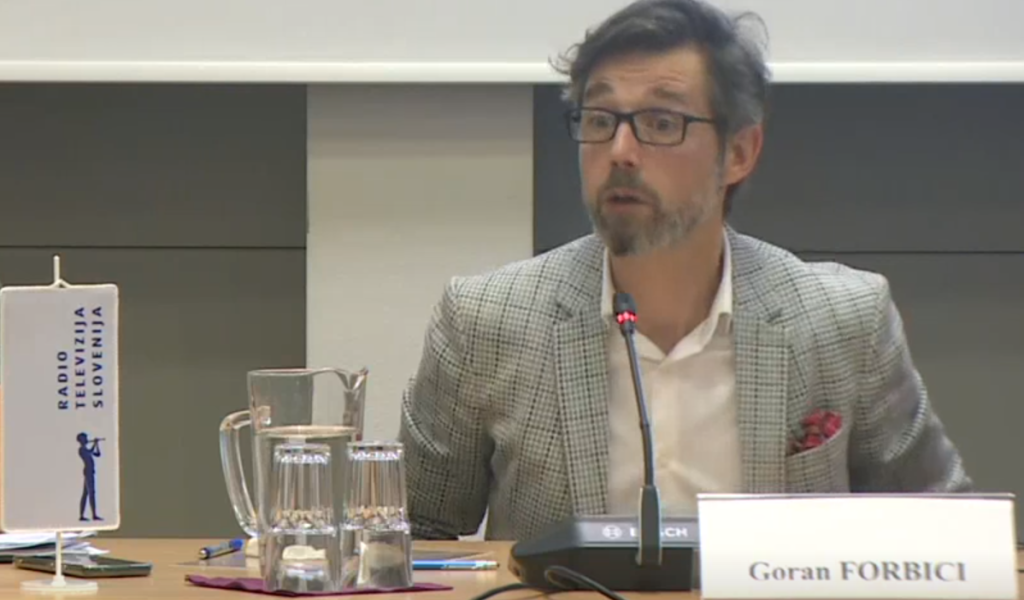After the promoters of the new Radio-Television Slovenia Act promised to depoliticise the national media outlet Radio-Television Slovenia (RTVS), the programme council was taken over by left-wing non-governmental organisations, after getting the confirmation from the Constitutional Court. Goran Forbici, the director of the CNVOS Centre of Slovenian NGOs, became chairman of the Programme Council of RTV. His deputy is Špela Stare, a representative of another ideologically single-minded organisation – the Slovene Association of Journalists.
On Monday, shortly after 6 p.m., the constitutive session of the new RTV Programme Council began, which would not have existed if we had the rule of law and constitutional judges who are not subordinate to the politics of the day. In this unconstitutional setting, the members of the council nevertheless made several decisions.
The acting Director-General of RTV Slovenia, Andrej Grah Whatmough, was absent, but the head of the legal service of RTV, Drago Zadergal, filled in for him. They did not want to hear his explanations and did not allow him to continue with the meeting. Later, the establishment of a Legal Commission was proposed. Sašo Hribar then even requested that Grah Whatmough not be invited to the meetings going forward. Many noticed that there was no dissent among the new councillors, who were chatting to each other as if they all already knew each other. The diversity of views and opinions that is the hallmark of a balanced media outlet is clearly a thing of the past.
The agenda of the meeting initially included only a declaratory decision on the composition of the RTVS Programme Council, but at the start of the meeting, the councillors unanimously approved the extension of the agenda. The councillors thus also adopted the rules of procedure, appointed a committee on the rules of procedure and a committee to prepare a call for tenders for the appointment of a four-member Management Board, which will run and manage the public institution following the amendment to the law. At the meeting, they also discussed the implementation of the financial and programme production plan.
The first meeting of the Programme Council attracted a lot of public attention, and here are some of the reactions of the public from social media: “We got the television of left-wing NGOs – so much for Golob’s ‘depoliticisation’,” wrote Peter Jančič, editor of the media outlet “Spletni časopis” (Online Newspaper).
Investigative journalist Bojan Požar wrote: “Well, now it’s official: the leadership of the RTV Slovenia has triumphantly been taken over by the far-left part of the political-social-media scene. The RTV Programme Council, unlike all previous councils, was practically unanimous in its decisions during today’s meeting and votes – which is very telling.”
Tom Zalaznik sarcastically described the fact that the new members of the Programme Council all work in such unison as poetry, adding that “all decisions are taken unanimously… And ‘blitzschnell’.”
Journalist Igor Pirkovič wrote: “What I can say is that the RTV Programme Council does not reflect the diversity of our society at all. It is as if one part of Slovenia has everything, and the other part has nothing. They all think in the same manner. Even all six representatives of the staff. There is no representative of pensioners, farmers, Catholics included… But the steamroller rolls on. They are quite helpless, though.”
Meanwhile, Igor Završnik shared the following: “At the inaugural meeting, Hribar once again managed, in his all-too-familiar manner, to utter a few insulting, derogatory words at the expense of the Acting Director. Primitivism has grown into every cell of his body.”
Director of Television of Slovenia, Uroš Urbanija, commented that the new Programme Council is an example of a democratic institution, as everything is decided unanimously. “This is where we are after 31 years,” he pointed out. And Tilen Majnardi agreed with him, writing: “This is what we have now. The RTV Council is discussing deadlines, decisions, and so on. Experts at work.” He also added the hashtag #depoliticisation.
Andrej Žitnik


